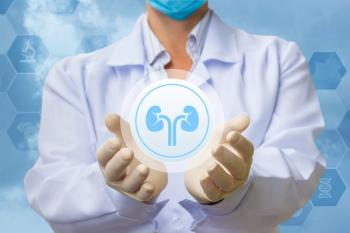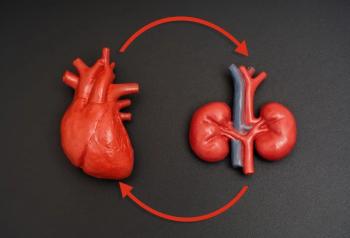
National Kidney Foundation: New Study Suggests Intervention for Kidney Disease Can Reduce Hospitalizations and Costs
National Kidney Foundation and CareFirst partnered for the first time on landmark study
A
Primary care physicians (PCPs) who used the inexpensive, underutilized urine albumin-creatinine ratio (uACR) test in combination with the more common
Conducted on more than 7,000 patients in CareFirst’s Patient-Centered Medical Home (PCMH) program from July 2015 to July 2017, the study helped PCPs save thousands of dollars per year per patient on certain healthcare costs,
“This study shows that the combination of both tests for CKD predict adverse outcomes including hospitalizations and 30-day readmissions as well as expenditures,” he said. “A simple, scalable CKD quality improvement intervention stratified by the test results showed short-term improvements in hospitalization and expenditures.”
An estimated 37 million American adults have CKD, but only 10 percent know it. One in three American adults are at risk of developing CKD. Only about 40% of American adults with diabetes receive an annual uACR test for kidney disease as recommended by the American Diabetes Association and the National Kidney Foundation’s Kidney Disease Outcomes Quality Initiative. In addition, these are the first real world data, to our knowledge, to show that expenditures increase by albuminuria classification or higher levels of uACR consistently both pre- and post-intervention.
“Chronic kidney disease is under-recognized by the public and, in many cases, under-diagnosed by physicians,” said CareFirst Chief Medical Officer Dr. Daniel Winn, a co-author of the study. “The traditional, standard ways to diagnose CKD are useful, but they’re not a complete, comprehensive screening. The uACR and eGFR tests taken together help categorize kidney disease and give physicians the information they need to develop the most appropriate treatment plans for their patients.”
Among the 7,420 patients treated during the study:
- The mean age per patient was 55.9 years;
- Nearly 52% were women;
- 19.1% had diabetes;
- 42.2% had hypertension; and,
- 38.2% had both conditions.
NKF and CareFirst, an independent licensee of the Blue Cross and Blue Shield Association, worked together to train hundreds of CareFirst employees and community clinicians, including PCPs, nurses, nephrologists, and nutritionists. Modest changes in testing and therapies -- including medical nutrition therapy and informed selection of nephrology practitioners by increasing nephrology services for advanced CKD -- contributed to the positive results.
“Health insurance plans and health systems should consider following CareFirst’s lead to design a similar intervention and train their teams in this effort because CKD quality improvement can significantly reduce costs and more importantly, improve patient outcomes,” Dr. Vassalotti said.
The authors of the study were Dr. Vassalotti of NKF and Icahn School of Medicine at Mount Sinai, New York; Rachel De Vinney, MPH, CHES, of CareFirst; Stacey Lukasik, BA, of CareFirst; Sandra McNaney, BS, CareFirst; Elizabeth Montgomery, BS, NKF; Cindy Voss, MA, CareFirst; and Daniel Winn, MD, CareFirst.
The study will be published today in The American Journal of Managed Care, a peer-reviewed journal with a large readership among the healthcare payer community. The article will be available by going to:
About CareFirst BlueCross BlueShield
In its 82nd year of service, CareFirst, an independent licensee of the Blue Cross and Blue Shield Association, is a not-for-profit health care company which, through its affiliates and subsidiaries, offers a comprehensive portfolio of health insurance products and administrative services to 3.2 million individuals and groups in Maryland, the District of Columbia and Northern Virginia. In 2018, CareFirst invested $38 million to improve overall health, and increase the accessibility, affordability, safety and quality of health care throughout its market areas. To learn more about CareFirst BlueCross BlueShield, visit our website at
About The American Journal of Managed Care®
NKF Professional Membership
Healthcare professionals can
Kidney Disease Facts
In the United States, 37 million adults are estimated to have chronic kidney disease (CKD) — and most aren’t aware of it. 1 in 3 American adults is at risk for CKD. Risk factors for kidney disease include diabetes, high blood pressure, heart disease, obesity, a family history of kidney failure, and being age 60 or older. People of African-American, Hispanic, Native American, Asian or Pacific Islander descent are at increased risk for developing the disease. African-Americans are about 3 times more likely than Whites to develop end-stage kidney disease (ESKD or kidney failure). Compared to non-Hispanics, Hispanics are almost 1.3 times more likely to receive a diagnosis of kidney failure.
The National Kidney Foundation (NKF) is the largest, most comprehensive, and longstanding patient-centric organization dedicated to the awareness, prevention, and treatment of kidney disease in the U.S. For more information about NKF, visit
Newsletter
Stay ahead of policy, cost, and value—subscribe to AJMC for expert insights at the intersection of clinical care and health economics.









